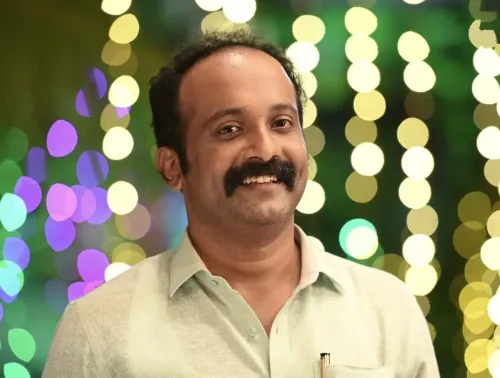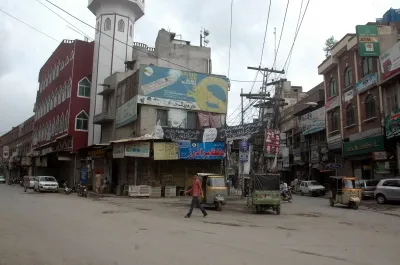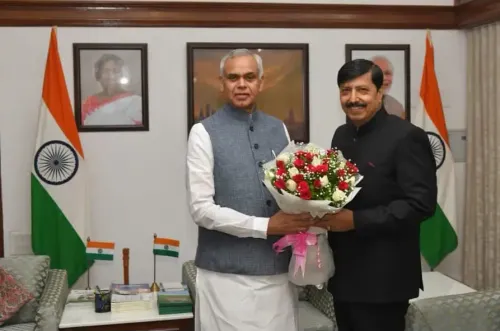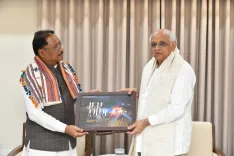How Did PM Modi Connect with PM-KUSUM Beneficiaries in Banswara?
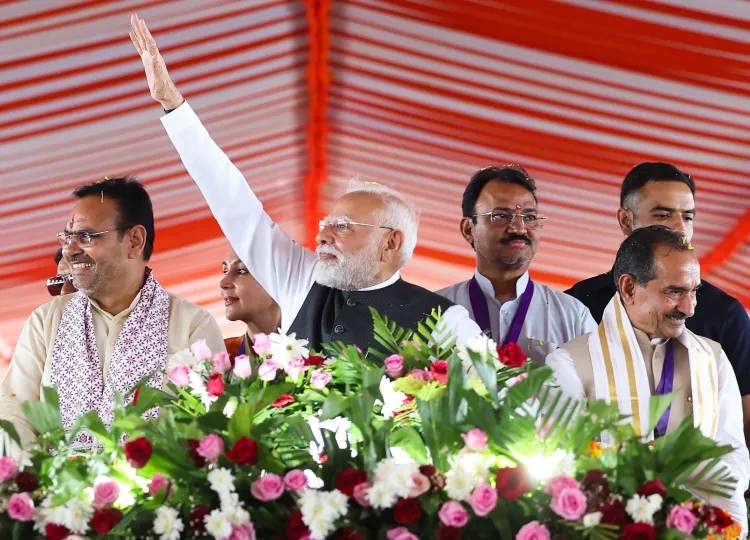
Synopsis
Key Takeaways
- PM-KUSUM scheme boosts farmers' income and confidence.
- Significant investments in clean energy projects in Rajasthan.
- Government committed to electrification and sustainable energy solutions.
- Farmers share positive experiences with the PM-KUSUM initiative.
- Banswara marks a new chapter in India's energy landscape.
Jaipur, Sep 25 (NationPress) On Thursday, Prime Minister Narendra Modi engaged with recipients of the PM-KUSUM Yojana from Rajasthan and other parts of India during a special event in Banswara, coinciding with the celebration of Pandit Deendayal Upadhyay Jayanti.
During this interaction, the Prime Minister conveyed his immense satisfaction regarding the substantial impact of the initiative on enhancing farmers' livelihoods.
He pointed out that the scheme is not only boosting incomes but also fostering greater confidence among its beneficiaries.
“While engaging with the PM-KUSUM beneficiaries in Banswara, I was filled with joy knowing that this initiative has remarkably enhanced their income. The confidence they exhibited during our conversation is clear evidence that our government’s schemes are effectively reaching and benefiting each citizen,” stated the Prime Minister on his X handle.
Among those he interacted with were Pappu Devi (Phalodi), Dharmendra Kumar (Kotputli), Jagdish Meghwal (Pratapgarh), Ramchandra Singh (Jodhpur), Prem Singh Kuntal (Bharatpur), and Sangharsh (Arthuna, Banswara).
The event was graced by the presence of Governor Haribhau Kisanrao Bagde, Chief Minister Bhajan Lal Sharma, Union Minister of New and Renewable Energy Prahlad Joshi, Deputy Chief Ministers Diya Kumari and Dr. Premchand Bairwa, along with MP Madan Rathore, among other distinguished guests.
The Prime Minister emphasized that the PM-KUSUM (Pradhan Mantri Kisan Urja Suraksha evam Utthan Mahabhiyan) initiative is empowering farmers by encouraging the adoption of solar energy in agriculture, reducing reliance on traditional power sources, and creating new income opportunities.
Farmers shared their testimonials on how the scheme has allowed them to switch to clean energy solutions, decrease input costs, and enhance productivity.
The Prime Minister praised their determination, calling it a testament to the success of farmer-focused policies.
On the same day, PM Modi laid the foundation stone for the Mahi Banswara Nuclear Power Project at Napla (Banswara), in the company of Governor Haribhau Kisanrao Bagde and Chief Minister Bhajan Lal Sharma.
Additionally, the Prime Minister inaugurated and laid the groundwork for several projects totaling over Rs 1.22 lakh crore nationwide. Rajasthan alone received development initiatives worth more than Rs 1.08 lakh crore, encompassing the Rs 42,000 crore nuclear power project and the introduction of three new trains, including two Vande Bharat Express services.
While addressing the audience, the Prime Minister remarked that during Navratri, when the nation honors the nine forms of Shakti, the foundation stone laying of the nuclear power project in Banswara signifies a new chapter in India’s energy capabilities.
He highlighted that the simultaneous launch of power projects worth Rs 90,000 crore across Rajasthan, Madhya Pradesh, Andhra Pradesh, Karnataka, and Maharashtra illustrates the nation’s advancement in expanding power generation capacity—from solar energy to nuclear energy.
Reflecting on the evolution of India’s power sector, the Prime Minister stated: “In this technological and industrial age, progress hinges on electricity. However, past administrations overlooked its significance. Even after 70 years of independence, 18,000 villages lacked electricity poles. In many rural areas, receiving 4–5 hours of electricity was deemed a luxury, while even large cities faced prolonged power outages. Factories struggled to operate without electricity. When our government assumed power in 2014, we committed to change this. We electrified every village and provided free electricity connections to 25 million households, thus improving lives.”
The Prime Minister reaffirmed the government’s dedication to clean and sustainable energy, noting that the PM Suryaghar Free Electricity Scheme is facilitating the installation of solar panels on rooftops in both urban and rural areas.
He also mentioned that under the PM-KUSUM initiative, solar pumps are being provided to farmers to guarantee affordable electricity for agricultural needs.
PM Modi emphasized that these initiatives are not only fortifying India’s energy security but also empowering individuals, diminishing reliance on traditional energy sources, and steering the nation towards a more sustainable future.

